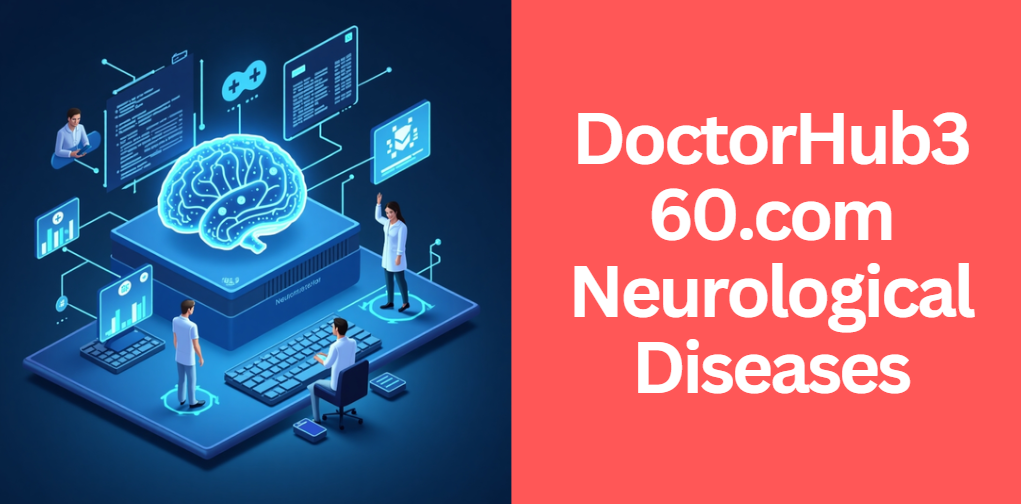In-Depth Guide to DoctorHub360.com Neurological Diseases
Neurological diseases affect millions of people worldwide and have a profound impact on daily life. Whether you are a patient, caregiver, or healthcare professional, understanding these disorders is crucial for effective management and care.
DoctorHub360.com Neurological Diseases offers a unique and reliable resource that covers everything from basic definitions to advanced treatment methods. Our guide is designed not only to educate but also to empower you to take control of your neurological health.
Understanding Neurological Diseases
Neurological diseases refer to a wide range of disorders that impact the brain, spinal cord, and peripheral nerves. These conditions can disrupt essential functions such as memory, movement, and sensory processing. They are broadly categorized into common and rare disorders, and they vary in severity.
For example, conditions such as Alzheimer’s, Parkinson’s, multiple sclerosis (MS), epilepsy, and migraines are some of the most frequently encountered. To give a clear picture, consider the table below which summarizes the common types of neurological diseases:
| Disease | Description | Impact |
|---|---|---|
| Alzheimer’s Disease | A progressive disorder causing memory loss and cognitive decline. | Severe impact on memory and daily activities. |
| Parkinson’s Disease | A movement disorder marked by tremors, stiffness, and balance issues. | Affects motor skills and overall mobility. |
| Multiple Sclerosis | An autoimmune condition where the immune system attacks nerve fibers, causing varied symptoms. | Can lead to physical disability over time. |
| Epilepsy | Characterized by recurrent seizures due to abnormal electrical activity in the brain. | Affects concentration and quality of life. |
| Migraines | Severe headaches often accompanied by nausea, visual disturbances, and sensitivity to light. | Can be debilitating, affecting daily routines. |
Causes and Risk Factors
Neurological diseases develop due to a combination of genetic, environmental, and lifestyle factors. In many cases, the cause is multifactorial. For instance, genetic predisposition can set the stage for conditions like Huntington’s disease, while lifestyle factors such as diet and exposure to toxins may trigger or exacerbate other disorders. Key factors include:
- Genetics: Inherited mutations can lead to conditions such as muscular dystrophy and Huntington’s disease.
- Environmental Factors: Exposure to harmful chemicals or toxins, and even certain infections, can contribute to neurological damage.
- Trauma and Injuries: Physical injuries, particularly head and spinal cord trauma, may result in long-term neurological issues.
- Autoimmune Responses: Disorders like multiple sclerosis occur when the body’s immune system mistakenly attacks its own nerve cells.
- Aging: As the body ages, the natural degeneration of nerve cells can lead to conditions such as Alzheimer’s and Parkinson’s diseases.
Recognizing Symptoms and Early Warning Signs
Early detection of neurological diseases is essential for effective treatment. Common symptoms include persistent headaches, memory loss, muscle weakness, tremors, and changes in mood or behavior.
If you experience any of these symptoms, it is important to consult with a healthcare professional promptly. The ability to recognize early warning signs can lead to timely interventions, which may slow the progression of these disorders.
Early Warning Signs List
- Memory Loss: Difficulty remembering recent events or familiar names.
- Tremors: Involuntary shaking, particularly in the hands or limbs.
- Weakness: Reduced muscle strength that affects daily activities.
- Mood Changes: Unexplained depression, anxiety, or irritability.
- Coordination Problems: Difficulty in maintaining balance or performing coordinated movements.
Diagnosis and Testing
Accurate diagnosis is the cornerstone of effective neurological disease management. Doctors use a combination of detailed medical history, physical examinations, and advanced diagnostic tests to determine the cause and extent of the disorder. Common diagnostic methods include:
- Imaging Techniques: Magnetic resonance imaging (MRI), computed tomography (CT) scans, and positron emission tomography (PET) scans provide detailed images of the brain and spinal cord.
- Electroencephalogram (EEG): This test measures the electrical activity in the brain and is especially useful in diagnosing epilepsy.
- Laboratory Tests: Blood tests and genetic testing can identify markers for infections, toxins, and inherited conditions.
- Lumbar Puncture: Also known as a spinal tap, this procedure collects cerebrospinal fluid for analysis, helping to detect infections and autoimmune disorders.
The use of telemedicine has also enhanced the early diagnosis process, making it easier for patients in remote areas to access specialist consultations.
Treatment Options and Management Strategies
Managing neurological diseases requires a comprehensive and personalized approach. Treatment strategies may include medications, surgical interventions, non-pharmacological therapies, and lifestyle modifications.
Pharmacological Interventions
Medications play a critical role in managing symptoms and slowing disease progression. For instance, cholinesterase inhibitors and memantine are commonly prescribed for Alzheimer’s disease, while levodopa is a cornerstone treatment for Parkinson’s disease. Newer drug therapies are continually emerging, offering hope for more effective management.
Surgical and Technological Innovations
In some cases, surgical interventions such as deep brain stimulation (DBS) provide significant relief. DBS is particularly beneficial for patients with Parkinson’s disease and severe epilepsy. Minimally invasive techniques are also gaining popularity, reducing recovery time and improving outcomes.
Non-Pharmacological Approaches
In addition to medications and surgery, physical therapy, occupational therapy, and lifestyle modifications are essential components of managing neurological diseases. Patients are encouraged to adopt a healthy diet rich in antioxidants, engage in regular exercise, and practice stress-reducing activities such as meditation. Alternative therapies, including acupuncture and neurofeedback, may also offer benefits.
Future Treatments
Cutting-edge research is paving the way for revolutionary treatments such as gene therapy and stem cell therapy. These emerging approaches hold promise for repairing damaged nerve cells and restoring lost functions.
The Role of Technology in Neurological Care
Technological advancements have transformed the landscape of neurological care. DoctorHub360.com Neurological Diseases leverages modern technology to enhance patient outcomes through:
- Telemedicine: Virtual consultations allow patients to connect with neurologists from the comfort of their homes, increasing accessibility and convenience.
- Artificial Intelligence: AI-driven diagnostic tools help in early detection by analyzing complex medical data, leading to faster and more accurate diagnoses.
- Digital Health Records: These ensure that patient information is shared seamlessly among healthcare providers, reducing errors and facilitating better care coordination.
- Wearable Devices: Emerging wearable technology enables continuous monitoring of neurological symptoms, allowing for proactive management of the condition.
Case Studies and Success Stories
Real-life examples bring a human touch to the data. Consider the success story of a patient who, after early diagnosis and a tailored treatment plan, experienced significant improvements in daily functioning and quality of life.
Comparative studies have shown that patients who actively engage with resources like DoctorHub360.com Neurological Diseases tend to have better outcomes. These case studies, accompanied by testimonials and expert reviews, serve as powerful evidence of the platform’s effectiveness.
Future Trends in Neurological Disease Management
The field of neurology is evolving rapidly with continuous research and technological advancements. Future trends include:
- Ongoing Clinical Trials: Innovative therapies are in the pipeline that may revolutionize treatment paradigms.
- Gene and Stem Cell Research: These approaches aim to repair and regenerate nerve cells, potentially offering cures for previously untreatable conditions.
- Integration of AI and Machine Learning: Enhanced diagnostic accuracy and personalized treatment plans are on the horizon.
- Increased Focus on Preventive Care: Emphasis on early detection and lifestyle modifications to delay the onset or progression of neurological diseases.
Navigating DoctorHub360.com
Using the DoctorHub360.com Neurological Diseases resource is simple and user-friendly. The website is designed with an intuitive layout that allows users to quickly find the information they need. A typical user journey might involve:
- Visiting the homepage to access the latest articles and expert insights.
- Using the search function to locate specific topics or symptoms.
- Booking appointments or telehealth consultations directly through the platform.
- Participating in community forums to share experiences and advice.
FAQs
What Future Innovations Are Expected on DoctorHub360.com for Neurological Diseases?
Users can look forward to new features such as enhanced AI-driven diagnostic tools, more comprehensive virtual support communities, and expanded partnerships with research institutions. These innovations aim to further personalize care and improve the overall experience in managing neurological health.
How Does DoctorHub360.com Maintain Content Accuracy and Reliability?
The platform utilizes a robust editorial review process where medical experts and researchers validate all articles and updates. This ensures that users receive the most current and accurate information without the need to cross-check multiple sources.
Can I Locate Neurology Specialists in My Area Through the Platform?
Yes, the website offers a local directory feature that allows users to search for neurologists and related healthcare providers by region. This directory includes detailed profiles, contact information, and patient feedback, which simplifies the process of finding the right specialist for your needs.
What Distinguishes DoctorHub360.com from Other Online Health Resources?
DoctorHub360.com combines interactive digital tools, expert advice, and a community-driven approach to provide a holistic user experience. Unlike many static sites, it integrates advanced telehealth services and personalized content, setting it apart as a dynamic resource for managing neurological health.
How Is User Privacy and Data Security Handled on DoctorHub360.com?
The platform is built with strong data protection measures, including encryption protocols and secure servers, to ensure that personal health information remains confidential. Regular security audits and compliance with international privacy standards further protect user data.
Conclusion
In summary, this guide to DoctorHub360.com Neurological Diseases offers a detailed, comprehensive, and user-friendly resource that covers everything from definitions and causes to cutting-edge treatments and future trends.
By integrating traditional medical knowledge with innovative technological solutions, the platform stands out as a valuable resource for patients, caregivers, and healthcare professionals alike. We hope this guide has provided you with the essential information needed to better understand and manage neurological conditions.
Thank you for reading. Embrace the journey towards better neurological health and explore more resources on DoctorHub360.com Neurological Diseases for a healthier tomorrow.
More Posts
2iddle Technology: A Comprehensive Guide to Next-Generation Content Discovery
In-Depth Guide on Daniel R Locke on Virtual AIA
The Ultimate Guide to Snap On 711IM Impact Socket Set: Features, Benefits and Expert Insights
Spring Ferraz A-102914 Right: The Ultimate Comprehensive Guide






